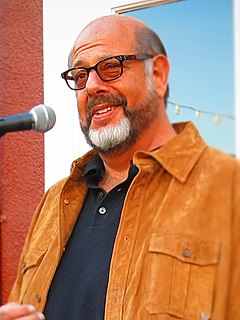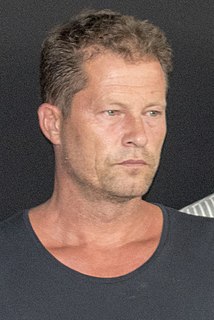A Quote by Steven Spielberg
I get very, very anxious on the set. I have a thousand ideas and I don't censor myself. I wind up cutting some of them out in the editing room... I shoot [needless footage] and then don't use later on in the process.
Related Quotes
There's this kind of incredibly mistaken idea that because it's so much cheaper to roll the camera than it used to be and it's so much easier to accumulate a ton of footage, that then you can just go shoot a ton of footage and the editor will make sense out of it. But if you don't have something deliberate made, you're not gonna save it in the editing room.
Separate out the creative act from the act of editing and execution. Make it a two-step process. First, let ideas flow and encourage EVERY idea to make it to the whiteboard. Don't criticize, judge, edit, budget, or worry. An idea on the wall can't hurt anyone, so let them rip without restriction. After any and all ideas have the opportunity to "come out to play", only then should you apply your analytical and logical side to the effort. Don't mix the creative process with the editing process or you'll kill your ideas before they even get a fighting chance.
If you take a big epic novel and you shoot it, when you get to the editing room you notice that it has 2 million climaxes, which fill the whole 90 or 100 minutes. Then you realize you can't cut them out because if somebody is dying and you cut that out it seems like they just disappear from the film.
There are some directors who don't like the set much. They like post-production, where you have all the ingredients in the can - you've got all the footage, all the music, the various effects - and then you have to do the alchemy necessary to make it all good, a long and very key process of putting everything together and making it into the cogent thing that you want.
A perfect movie is a different thing, but a funny movie is easy. I was really happy that I got everyone that I got. Everybody got to play to their strengths and was paired up in the right scenarios. It was very fortunate. It was exciting, the whole process. It makes more difficulty in editing 'cause there's more footage, but the guy I had handle it was a documentarian editor for a long time, so it was very useful.
You have to be dynamic. You have to be able to change. So a lot of times we'll go to a country or go meet people, and then while we're there, the story changes and you have to be able to go with that. And then the story comes out in the editing room, which is a very documentary sort of process - not how news works. So that's different.
There was no actually stock footage in "Medium Cool." I wrote the script. I wrote the riots. And I integrated the actors in the film in the park during the demonstrations. But nowhere was it like we had stock footage and then later, in editing, integrated it into the film. It was all done at the time.
My editor and I remain very disciplined. It's just sometimes when you're making a film, you get into the cutting room and you see a scene that's slowing you down in a certain section, but if you remove that scene then, emotionally or story-wise, another scene a half-hour later won't have the same impact. You just get stuck with it.
All three parts of filmmaking [writing, shooting, editing] contribute to rhytm. You want the script to be a tight as possible, you want the acting to be as efficient as possible on the set, and you have enough coverage to manipulate the rhythm in the editing room, and then in the editing room you want to find the quickest possible version, even if it's a leisurely paced film. I definitely in filmmaking more and more find writing and directing a means to harvest material for editing. It's all about editing.






































